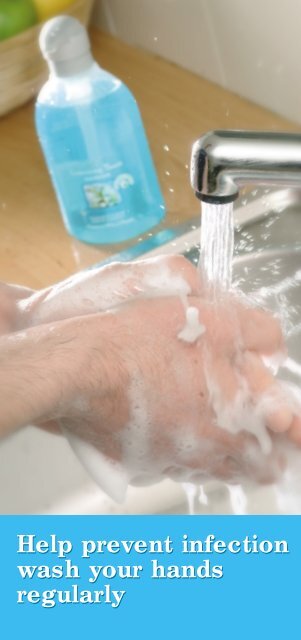Hand Washing Leaflet
Hand Washing Leaflet
Hand Washing Leaflet
You also want an ePaper? Increase the reach of your titles
YUMPU automatically turns print PDFs into web optimized ePapers that Google loves.
Help prevent infection<br />
wash your hands<br />
regularly
Why<br />
should we<br />
wash our<br />
hands?<br />
Just think of all the things we touched<br />
today which would have been touched<br />
by other people – money, door handles,<br />
cash machines, toilets, phones. Germs<br />
can be anywhere. Disease-causing<br />
germs enter our body when our<br />
unwashed hands touch our nose, mouth<br />
or eyes. We can also make others sick<br />
by passing on the germs to them.<br />
No one is safe from infection. Germs<br />
are so small that we can’t see them.<br />
• They can cause illnesses like colds,<br />
diarrhoea, vomiting and often more<br />
serious, sometimes even lifethreatening<br />
diseases like meninigitis.<br />
• <strong>Washing</strong> our hands greatly reduces<br />
the chances of spreading germs.<br />
• Scientists have discovered that<br />
proper hand washing is a good<br />
defence against serious infections –<br />
around 45% of infections may be<br />
prevented by regular hand washing.<br />
• Plain soap and water can stop the<br />
spread of disease.
Surely everyone<br />
does it?<br />
While many people are taught to wash<br />
their hands as children, not everyone<br />
makes hand washing a priority.<br />
A survey by the Food and Drink<br />
Federation in 2001 found that 31% of<br />
men and 17% of women said they do<br />
not regularly wash their hands after<br />
using the toilet.<br />
If we begin to keep track of when we<br />
wash our hands, we may find it’s not<br />
as often as we think.
When<br />
should we<br />
wash our<br />
hands?<br />
Before we:<br />
• prepare, serve or eat food;<br />
• treat a cut or wound or tend to<br />
someone who is sick;<br />
• insert or remove contact lenses;<br />
After we:<br />
• go to the toilet;<br />
• handle uncooked foods, particularly<br />
raw meat, poultry or fish;<br />
• change a nappy;<br />
• blow our nose, cough or sneeze;<br />
• handle rubbish;<br />
• tend to someone who is sick<br />
or injured;<br />
• handle an animal or animal waste.
How<br />
should we<br />
wash our<br />
hands?<br />
How we wash our hands is just as<br />
important as when we wash them,<br />
especially when it comes to eliminating<br />
germs. We don’t need any special<br />
cleaners or cleaning equipment – just<br />
soap and water.<br />
When we wash our hands we should:<br />
• use soap and warm, running water;<br />
• wash all surfaces thoroughly,<br />
including wrists, palms, backs of hands,<br />
between fingers and under fingernails;<br />
• rub hands together for up to<br />
20 seconds;<br />
• rinse away all soap;<br />
• dry hands with paper towel, clean<br />
fabric towel or warm air dryer;<br />
• pat the skin rather than rub to avoid<br />
chapping and cracking.
How can we<br />
help children<br />
with good<br />
hand washing<br />
technique?<br />
It is important to encourage and help<br />
children to wash hands properly and<br />
often. We shouldn’t assume they know<br />
how to wash their hands properly.<br />
Children also learn by example so it’s<br />
important that they see us washing our<br />
hands properly and regularly.<br />
Help prevent infection<br />
wash your hands<br />
regularly<br />
Produced by the Health Promotion Agency for Northern Ireland<br />
18 Ormeau Avenue, Belfast BT2 8HS<br />
Tel: 028 9031 1611 (Voice/Minicom) Fax: 028 9031 1711<br />
www.healthpromotionagency.org.uk

















